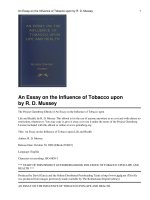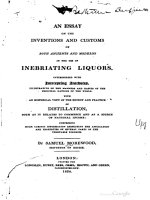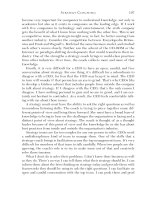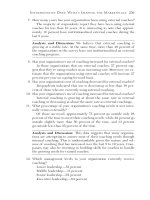AN ESSAY ON THE NATURE ftf SIGNIFICANCE OF ECONOMIC SCIENCE phần 8 potx
Bạn đang xem bản rút gọn của tài liệu. Xem và tải ngay bản đầy đủ của tài liệu tại đây (802.98 KB, 17 trang )
v ECONOMIC GENERALISATIONS AND REALITY 105
tests of its logical consistency—are often different from
the methods of the natural sciences. But it does not
follow in the least that its generalisations have a
"merely formal" status—that they are "scholastic"
deductions from arbitrarily established definitions.
Indeed, it may be urged that, on the contrary, there is
less reason to doubt their real bearing than that of the
generalisations of the natural sciences. In Economics,
as we have seen, the ultimate constituents of our
fundamental generalisations are known to us by im-
mediate acquaintance. In the natural sciences they
are known only inferentially. There is much less
reason to doubt the counterpart in reality of the
assumption of individual preferences than that of the
assumption of the electron.
1
It is true that we deduce
much from definitions. But it is not true that the
definitions are arbitrary.
It follows, too, that it is a complete mistake to
regard the economist, whatever his degree of "purity",
as concerned merely with pure deduction. It is quite
true that much of his work is in the nature of elaborate
processes of inference. But it is quite untrue to sup-
pose that it is only, or indeed mainly, thus. The con-
cern of the economist is the interpretation of reality.
The business of discovery consists not merely in the
elucidation of given premises but in the perception of
the facts which are the basis of the premises. The
process of discovering those elements in common ex-
perience which afford the basis of our trains of de-
ductive reasoning is economic discovery just as much
as the shaking out of new inferences from old premises.
The theory of value as we know it has developed in
1
See the classical discussion of this matter in Cairnes' Character and
Logical Method of Political Economy, 2nd edition, pp. 81-99. See also Hayek:
Collectivist Economic Planning, pp. 8-12.
106 SIGNIFICANCE OF ECONOMIC SCIENCE OH.
recent times by the progressive elaboration of deduc-
tions from very simple premises. But the great dis-
covery, the Mengerian revolution, which initiated this
period of progress, was the discovery of the premises
themselves. Similarly with the other foundations we
have discussed. The perception and selection of the
basis of economic analysis is as much economics as the
analysis
itself.
Indeed it is this which gives analysis
significance.
2.
At the same time it must be admitted that the
propositions which have hitherto been established are
very general in character. If a certain good is scarce,
then we know that its disposal must conform to cer-
tain laws. If its demand schedule is of a certain order,
then we know that with alterations of supply its
price must move in a certain way. But, as we have
discovered already,
1
there is nothing in this con-
ception of scarcity which warrants us in attaching
it to any particular commodity. Our deductions do
not provide any justification for saying that caviare
is an economic good and carrion a disutility. Still
less do they inform us concerning the intensity of the
demand for caviare or the demand to be rid of carrion.
From the point of view of pure Economics these things
are conditioned on the one side by individual valua-
tions,
and on the other by the technical facts of the
given situation. And both individual valuations and
technical facts are outside the sphere of economic
uniformity. To use Strigl's expressive phrase, from the
point of view of economic analysis, these things consti-
tute the
irrational
element in our universe of discourse.
2
But is it not desirable to transcend such limita-
1
See above, Chapter II., Sections 1, 2, 3.
2
Strigl, op. cü„ p. 18.
v ECONOMIC GENERALISATIONS AND REALITY 107
tions? Ought we not to wish to be in a position to give
numerical values to the scales of valuation, to establish
quantitative laws of demand and supply? This raises,
in a slightly different form, some of the questions we
left unanswered at the conclusion of the last chapter.
No doubt such knowledge would be useful. But a
moment's reflection should make it plain that we are
here entering upon a field of investigation
where there
is no
reason
to suppose that uniformities are to be dis-
covered.
The "causes" which bring it about that the
ultimate valuations prevailing at any moment are
what they are, are heterogeneous in nature: there is
no ground for supposing that the resultant effects
should exhibit significant uniformity over time and
space. No doubt there is a sense in which it can be
argued that every random sample of the universe is
the result of determinate causes. But there is no
reason to suppose that the study of a random sample
of random samples is likely to yield generalisations
of any significance. That is not the procedure of the
sciences. Yet that, or something very much like it,
is the assumption underlying the expectation that the
formal categories of economic analysis can be given
substantial content of permanent and constant value.
1
A simple illustration should make this quite clear.
Let us take the demand for herrings. Suppose we are
confronted with an order fixing the price of herrings
at a point below the price hitherto ruling in the market.
Suppose we were in a position to say, "According to
the researches of Blank (1907-1908) the elasticity of
demand for the common herring (Clupea harengus)
is l¯3; the present price-fixing order therefore may be
1
Note the qualification "permanent and constant value". Before the
above conclusion is dismissed as too drastic, the remarks below on the
positive value of investigations of this sort should be examined.
108 SIGNIFICANCE OF ECONOMIC SCIENCE CH.
expected to leave an excess of demand over supply of
two million barrels". How pleasant ifc would be to
be able to say things like this! How flattering to
our usually somewhat damaged self-esteem vis-a-vis
the natural scientists! How impressive to big busi-
ness!
How persuasive to the general public!
But can we hope to attain such an enviable position?
Let us assume that in 1907-1908 Blank had succeeded
in ascertaining that, with a given price change in that
year, the elasticity of demand was l·3. Rough com-
putations of this sort are not really very difficult and
may have considerable utility for certain purposes. But
what reason is there to suppose that he w¾s unearth-
ing a constant law? No doubt the herring meets
certain physiological needs which are capable of fairly
accurate description, although it is by no means the
only food capable of meeting these
needs.
The demand
for herrings, however, is not a simple derivative of
needs.
It is, as it were, a function of a great many
apparently independent variables. It is a function of
fashion; and by fashion is meant something more than
the ephemeral results of an Eat British Herrings
campaign; the demand for herrings might be sub-
stantially changed by a change in the theological
views of the economic subjects entering the market.
It is a function of the availability of other foods. It
is a function of the quantity and quality of the popu-
lation. It is a function of the distribution of income
within the community and of changes in the volume
of money. Transport changes will alter the area of
demand for herrings. Discoveries in the art of cooking
may change their relative desirability. Is it possible
reasonably to suppose that coefficients derived from
the observation of a particular herring market at a
v ECONOMIC GENERALISATIONS AND REALITY 109
particular time and place have any permanent signifi-
cance—save as Economic History"?
Now, of course, by the aid of various devices it is
possible to extend the area of observation over periods
of time. Instead of observing the market for herrings
for a few days, statistics of price changes and changes
in supply and demand may be collected over a period
of years and by judicious "doctoring" for seasonal
movements, population change, and so on, be used to
deduce a figure representing average elasticity over
the period. And within limits such computations
have their uses. They are a convenient way of de-
scribing certain forces operative during that period of
history. As we shall see later on, they may provide
some guidance concerning what may happen in the
immediate future. Eough ideas relating to the elasti-
city of demand in particular markets are indeed
essential if we are to make full use of the more refined
tools of economic analysis. But they have no claim
to be regarded as immutable laws. However ac-
curately they describe the past, there is no presump-
tion that they must continue to describe the future.
Things have just happened to be so in the past. They
may continue to be so for a short time in the future.
But there is no reason to suppose that their having
been so in the past is the result of the operation of
homogeneous causes, nor that their changes in the
future will be due to the causes which have operated
in the past. If we wanted to be helpful about herrings
we should never dream of relying on the researches of
the wretched Blank who was working in 1907-8. We
should work the whole thing out afresh on the basis
of more recent data. Important as such investigations
may be—and nothing that
is
here said on their method-
110 SIGNIFICANCE OF ECONOMIC SCIENCE CH.
ological status should
be
regarded
as
derogating from
their very considerable practical value—there
is no
justification
for
claiming
for
their results
the
status
of
the
so-called "statistical" laws
of the
natural
sciences.
1
But,
it
might be said, is not the difference between
the results
of
such investigation
and the
postulates
on
which,
as was
shown
in the
last chapter,
the
main
generalisation
of
Economics depends,
a
matter only
of
degree
rather than kind?
It
has been shown that
if
there were
not a
hierarchy
of
ends,
but if
the different
ends were
all of
equal importance,
the
results
of
con-
duct would
be
quite indeterminate, and even the most
elementary generalisations
of the
theory
of
value
would
not be
applicable. There
is no
guarantee that
this will not happen.
It
is only
a
matter
of
probability
that
the
conditions making such propositions
ap-
plicable will persist.
In
exactly
the
same
way it can
be shown analytically that circumstances
are con-
ceivable
in
which
the
demand curve
may
have
a
positive inclination.
Yet if
this were frequent many
of
the
best accepted generalisations
of
deductive
theory would
not be
applicable. Again,
it is
only
a
matter of probability that this is not the case. Wherein
is
the
difference
of
kind between this assumption
and
the assumption that
the
elasticity
of
demand
for
herrings is l·3?
The argument
is
weighty.
And it may be
freely
conceded that in this sense the difference is
a
difference
of degree rather than
a
difference
of
kind.
But it is
surely open
to the
reply that
the
difference
of
degree
is
so
great
as to
justify
our
acting
as if it
were
a
1
On the
problems discussed above very interesting remarks
are to be
found
in
Halberstaédter,
Die
ProbUmatik des wirtschafüichen Prinzips.
v ECONOMIC GENERALISATIONS AND KEALITY 111
difference of
kind.
It might be the case that valuations
were of such a peculiar nature that conduct was in-
determinate. But it is so overwhelmingly unlikely
that we are warranted in neglecting the possibility.
It is not so unlikely that the demand function may be
positive, but there is still a very strong probability
that this is not the rule, but the exception. On the
other hand, when we are dealing with the valuation
of particular products and the elasticity of demand
derived therefrom, for the reasons already set forth,
there is surely an overwhelming probability that con-
stancy is not to be expected. Here, indeed, we have
the historico-relative in
excelsis.
The fact that we can
arrange our preferences in an order is a fact of
so
much
greater a degree of generality than the actual momen-
tary order of preference of any individual that we are
surely justified in regarding them as possessing, in our
universe of discourse at least, a difference of status.
And while it is arguable that in the future much
valuable work will be done in attempting to ascertain
these momentary values, it seems more important, if
a sense of proportion is to be maintained, that their
limitations should be realised than that stress should be
laid on the formal similarity with the broad qualita-
tive foundations which constitute the basis of the
science as we know it. Perhaps, indeed, this is another
of the methodological differences between the natural
and the social sciences. In the natural sciences the
transition from the qualitative to the quantitative
is easy and inevitable. In the social sciences, for
reasons which have already been set forth, it
is
in some
connection almost impossible, and it is always as-
sociated with peril and difficulty. It seems clear, from
what has happened already, that less harm is likely
112 SIGNIFICANCE OF ECONOMIC SCIENCE
CH
.
to be done by emphasising the differences between
the social and the natural sciences than by emphasising
their similarities.
1
3.
If this is true of attempts to provide definite
quantitative values for such elementary concepts as
demand and supply functions, how much more does
it apply to attempts to provide "concrete" laws of the
movement of more complex phenomena, price fluctua-
tions,
cost dispersions, business cycles, and the like.
In the last ten years there has been a great multiplica-
tion of this sort of thing under the name of Institu-
tionalism, "Quantitative Economics", "Dynamic Eco-
nomics ", and what not
;
2
yet most of the investigations
involved have been doomed to futility from the outset
and might just as well never have been undertaken.
The theory of probability on which modern mathe-
matical statistics is based affords no justification for
averaging where conditions are obviously not such as
to warrant the belief that homogeneous causes of
different kinds are operating. Yet this is the normal
procedure of much of the work of this kind. The
correlation of trends subject to influences of the most
diverse character is scrutinised for "quantitative
laws".
Averages are taken of phenomena occurring
under the most heterogeneous circumstances of time
and space, and the result is expected to have signifi-
cance. In Professor Wesley Mitchell's Business
Cycles,
3
1
On the matters discussed in this section I am much indebted to con-
versations with Dr. Machlup.
2
On the aspect of Institutionalism discussed below, Professor Wesley
Mitchell's essay on
'1
he Prospects of Economics in the Trend of Economics
(edited Tugwell) should be consulted. On the general position of the school,
Bee Morgenstem, Bemerkungen úber die Problematik der Amerikanischen
Inslitutionalisten in the Saggi di Storia e Teoria Economica in onore e recordo
diO¡useppe Praia, Turin, 1931; Fetter, art. America, Wirtschaflstheorie der
Oegenwart, Bd. 1, pp. 31-60. See also the review of the Trend of Economics
by the late Professor Allyn Young, reprinted in his Economic Problems New
and Old, pp. 232-260.
3
Business Cycles, 2nd edition, p. 419.
v ECONOMIC GENERALISATIONS AND REALITY 113
for instance, a work for whose magnificent collection
of
data economists are rightly grateful, after a prolonged
and valuable account of the course of business fluctua-
tions in different countries since the end of the eigh-
teenth century, an average is struck of the duration
of all cycles and a logarithmic normal curve is fitted by
Davies' Method to the frequency distribution of the
166 observations involved. What possible meaning
can inhere in such an operation? Here are observa-
tions of conditions widely differing in time, space, and
the institutional framework of business activity. If
there is any significance at all in bringing them
together, it must be by way of
contrast.
Yet Professor
Mitchell, who never tires of belittling the methods
and results of orthodox analysis, apparently thinks
that, by taking them all together and fitting a highly
complicated curve to their frequency distribution, he
is constructing something significant—something
which is more than a series of straight lines and
curves on half a page of his celebrated treatise.
1
Certainly he has provided the most mordant comment
on the methodology of "Quantitative Economics"
that any of its critics could possibly wish.
There is no need to linger on the futility of these
grandiose projects. After all, in spite of their recent
popularity, they are not new, and a movement which
has continually invoked a pragmatic logic may well
be judged by a pragmatic test. It is just about a
1
On this see Morgenstern, International vergleichende Konjunktur-
}orschung(Zeitschrift fur die
Gesammte
Staatswisse7ischaft,
vol.lxxxiii.,p.261).
In the second edition of his book. Professor Mitchell attempts to meet
Dr. Morgenstern's strictures in an extensive footnote, but so far as I can
see,
beyond urging that his observations for China relate to coast towns (!),
he does not go beyond a reiteration that "the distribution of the observa-
tions around their central tendency is a matter of much theoretical interest"
(Bus¡msa
Cycles,
2nd edition, p. 420).
8
114 SIGNIFICANCE OF ECONOMIC SCIENCE OH.
hundred years ago since Richard Jones, in his In-
augural Lecture at King's College, London,
1
sounded
the note of revolt against the "formal abstraction" of
Eicardian Economics, with arguments which, if more
vividly expressed, are more or less exactly similar to
those which have been expressed by the advocates of
"inductive methods" ever since that day. And time
has gone on, and the "rebels" have become a highly
respectable band of expert authorities, the pontifical
occupants of chairs, the honoured recipients of letters
from the Kaiser, the directing functionaries of expen-
sive research institutes. . . . We have had the His-
torical School. And now we have the Institutionalists.
Save in one or two privileged places, it is safe to say
that, until the close of the War, views of this sort were
dominant in German University circles; and in recent
years,
if they have not secured the upper hand
altogether, they have certainly had a wide area of
power in America. Yet not one single "law" deserving
of the name, not one quantitative generalisation of
permanent validity has emerged from their efforts.
A certain amount of interesting statistical material.
Many useful monographs on particular historical
situations. But of "concrete laws", substantial uni-
formities of "economic behaviour", not one—all the
really interesting applications of modern statistical
technique to economic enquiry have been carried
through, not by the Institutionalists, but by men
who have been themselves adept in the intricacies
1
Richard Jones,
Collected
Works,
pp.
21
and 22. The comparison is not
altogether fair to Jones, who may have been very well justified in some of
his criticisms of the Ricardian system. The true precursor of modern
"Quantitative Economics" was Sir Josiah Child, who attempted to prove
that the concomitance of low interest rates and great riches was an indica-
tion that the latter was the result of the former.
v ECONOMIC GENERALISATIONS AND REALITY
115
of
the
"orthodox" theoretical analysis.
And, at the
end
of the
hundred years,
the
greatest slump
in
history finds them sterile
and
incapable
of
helpful
comment—their trends gone awry
and
their
dis-
persions distorted.
1
Meanwhile,
a few
isolated
thinkers, using
the
despised apparatus
of
deductive
theory, have brought
our
knowledge
of the
theory
of
fluctuations to
a
point from which
the
fateful events
of the last few years can be explained
in
general terms,
and
a
complete solution
of the
riddle
of
depressions
within
the
next
few
years does
not
seem outside
the
bounds
of
probability.
4.
But
what, then,
are we to say of the
more
detailed kind
of
realistic studies? Having ascertained
the persistence
of the
fact
of
scarcity,
the
multiplicity
of factors
of
production, ignorance
of the
future,
and
the other qualitative postulates
of his
theory,
is the
economist then excused from
the
obligation
of
main-
taining further contact with reality?
The answer
is
most decidedly
in the
negative.
And
the
negative answer
is
implicit
in the
practice
of
all those economists
who,
since Adam Smith
and
Cantillon, have contributed most
to the
development
of Economic Science.
It has
never been
the
case that
the exponents
of the
so-called orthodox tradition have
frowned upon realistic studies.
As
Menger pointed
out years
ago, at the
height
of the
MetL·äenstreit,
z
the analytical school have never been
the
assailants
in these controversies. Economics
is not one of
those
1
The discredit of the Historical School in Germany is very largely due
to the failure of its members to understand the currency disturbances of the
War and the post-War period. It is not improbable that the utter failure of
"
Quantitative Economics" to understand or predict the great depression
may be followed by a similar revulsion. It would certainly be difficult to
imagine a more complete or more conspicuous exposure.
2
Die
Irrthümer
des
IHstorismv,s, Preface, pp. iii.
and iv.
116 SIGNIFICANCE OF ECONOMIC SCIENCE OH.
social sciences which are always discussing method
before proceeding to deliver the goods; if it had not
been for the Historical School there would have been
no methodological controversy save such as related to
the status of particular propositions. The procedure
of "orthodoxy" has always been essentially catholic.
The attacks, the attempts to exclude, have always
come from the other side. The analytics have always
acknowledged the importance of "realistic" studies,
and have themselves contributed much to the de-
velopment of the technique of investigation. Indeed,
it is notorious that the most important work of this
kind has come, not from this or that "rebel" group
who were calling in question the application in Eco-
nomics of the elementary laws of thought, but rather
from just those men who were the object of their
onslaught. In the history of applied Economics, the
work of a Jevons, a Menger. a Bowley, has much
more claim on our attention than the work of,
say, a Schmoller, a Veblen, or a Hamilton. And this
is no accident. The fruitful conduct of realistic investi-
gations can only be undertaken by those who have a
firm grasp of analytical principle and some notion of
what can and what cannot legitimately be expected
from activities of this sort.
But what, then, are legitimate expectations in
this respect? We may group them under three
headings.
The first and the most obvious is the provision of
a check on the applicability to given situations of
different types of theoretical constructions. As we
have seen already, the validity of a particular theory
is a matter of its logical derivation from the general
assumptions which it makes. But its applicability to a
v ECONOMIC GENEEALISATIONS AND EEALITY 117
given situation depends upon the extent to which its
concepts actually reflect the forces operating in that
situation. Now the concrete manifestations of scarcity
are various and changing; and, unless there is con-
tinuous check on the words which are used to describe
them, there is always a danger that the area of applica-
tion of a particular principle may be misconceived.
The terminology of theory and the terminology of
practice, although apparently identical, may, in fact,
cover different areas.
A simple illustration will make this clear. Accord-
ing to pure monetary theory, if the quantity of money
in circulation is increased and other things remain the
same, the value of money must fall. This proposition is
deducible from the most elementary facts of experience
of the science, and its truth is independent of further
inductive test. But its applicability to a given situation
depends upon a correct understanding of what things
are to be regarded as money; and this is a matter
which can only be discovered by reference back to the
facts.
It may well be that over a period of time the
concrete significance of the term "money" has altered.
If then, while retaining the original term, we proceed
to interpret a new situation in terms of the original
content, we may be led into serious misapprehension.
We may even conclude that the theory is fallacious.
It is indeed well known that this has happened again
and again in the course of the history of theory. The
failure of the Currency School to secure permanent
acceptance for their theory of Banking and the Ex-
changes, in other respects so greatly superior to that
of their opponents, was notoriously due to their failure
to perceive the importance of including Bank Credit
in their conception of money. Only by continuous
118 SIGNIFICANCE OF ECONOMIC SCIENCE OH.
sifting and scrutiny of the changing body of facts
1
can such misapprehensions be avoided.
Secondly, and closely connected with this first
function of realistic studies, we may expect the sug-
gestion of those auxiliary postulates whose part in the
structure of analysis was discussed in the last chapter
By inspection of different fields of economic activity
we may expect to discover types of the configuration
of the data suitable for further analytical study.
Again, we may take an example from the theory
of money. It will be clear from an inspection of the
actual procedure of banks of issue that the efEect upon
the supply of money in the widest sense of given addi-
tions to the reserve of precious metals will depend upon
the exact nature of the law and practice concerning re-
serve requirements. It follows, therefore, that in the
full elaboration of the theory of money we must intro-
duce alternative assumptions, taking account of the
various possibilities in this respect. It is clear that
these are not possibilities which are necessarily easily
exhausted by general reflections on the nature of
banks of issue. Only close study of the facts is likely
to reveal which assumptions are most likely to have
a counterpart in reality, which assumptions, there-
fore,
it is most convenient to make.
And, thirdly, we may expect of realistic studies,
not merely a knowledge of the application of par-
ticular theories, and the assumptions which make
them appropriate to particular situations, but also
the exposure of areas where pure theory needs to be
reformulated and extended. They bring to light new
problems.
1
Professor Jacob Viner's Canadian Balance of International Indebtedness
and Professor Taussig's International Trade provide classical examples of
this kind of investigation.
v ECONOMIC GENERALISATIONS AND REALITY 119
The best example of the unexplained residue is
provided by those fluctuations of trade which have
come to be known as the trade cycle. Elementary
equilibrium theory, as is well known, does not provide
any explanation of the phenomena of booms and
slumps. It explains the relationships in an economic
system on a state of rest. As we have seen, with a
certain extension of its assumptions it can describe
differences between the relationships resulting from
different configurations of the data. But it does not
explain without further elaboration the existence
within the economic system of tendencies conducive
to disproportionate development. It does not explain
discrepancies between total supply and total demand
in the sense in which these terms are used in the
celebrated Law of Markets.
1
Yet unquestionably
such discrepancies exist, and any attempt to interpret
reality solely in terms of such a theory must neces-
sarily leave a residue of phenomena not capable of
being subsumed under its generalisations.
Here is a clear case where empirical studies bring us
face to face with the insufficiencies of certain general-
isations. And it is perhaps in the revelation of defi-
ciencies of this kind that the main function of realistic
studies in relation to theory consists.
2
The theoretical
economist who wishes to safeguard the implications
of his theory must be continually "trying out", in the
explanation of particular situations, the generalisations
he has already achieved. It is in the examination of
particular instances that lacunæ in the structure of
existing theory tend to be revealed.
1
On all this see Hayek,
Monetary Theory
and the Trade
Cycle,
chaps
i. and ii., passim.
2
Another important function, this time in relation to practice, will be
discussed in the next section.
120 SIGNIFICANCE OF ECONOMIC SCIENCE OH.
But this is not in the least to say that the solutions
of the problems thus presented are themselves to be
discovered by the mere multiplication of observations
of divergences of this sort. That is not the function
of observation, and the whole history of the various
"inductive revolts" shows that all studies based on
this expectation have proved utterly fruitless. This is
particularly true of trade cycle theory. So long as the
investigators of this problem were content with the
multiplication of time series and the accumulation of
coefficients of correlation, no significant advance was
discernible. It was not until there arose men who
were prepared to undertake the entirely different
task of starting where elementary theoretical analysis
leaves off and deriving from the introduction of
further assumptions of the elementary qualitative
nature we have already examined, an explanation of
fluctuation which is compatible with the assumptions
of that analysis, that progress began to be made.
There can be no better example of the correct
relationship between the two branches of study.
Realistic studies may suggest the problem to be solved.
They may test the range of applicability of the answer
when it is forthcoming. They may suggest assump-
tions for further theoretical elaboration. But it is
theory and theory alone which is capable of supply-
ing the solution. Any attempt to reverse the relation-
ship must lead inevitably to the nirvana of purpose-
less observation and record.
Moreover—and this brings us back to the point
from which we started—there is no reason to believe
that the generalisations which may be elaborated to
explain the residues thus discovered will be anything
but general in character. For reasons which we have
v ECONOMIC GENERALISATIONS AND REALITY 121
already examined, the hope of giving permanent and
particular content to the categories of pure analysis
is vain. By "trying out" pure theory on concrete
situations and referring back to pure theory residual
difficulties, we may hope continually to improve and
extend our analytical apparatus. But that such
studies should enable us to say what goods must be
economic goods and what precise values will be
attached to them in different situations, is not to be
expected. To say this is not to abandon the hope of
solving any genuine problem of Economics. It is
merely to recognise what does and what does not lie
within the necessary boundaries of our subject-matter.
To pretend that this is not so is just pseudo-scientific
bravado.
5.
But to recognise that Economic laws are general
in nature is not to deny the reality of the necessi-
ties they describe or to derogate from their value as
a means of interpretation and prediction. On the
contrary, having carefully delimited the nature and
the scope of such generalisations, we may proceed
with all the greater confidence to claim for them a
complete necessity within this field.
Economic laws describe inevitable implications.
If the data they postulate are given, then the con-
sequences they predict necessarily follow. In this
sense they are on the same footing as other scientific
laws,
and as little capable of "suspension". If, in a
given situation, the facts are of a certain order, we
are warranted in deducing with complete certainty
that other facts which it enables us to describe are
also present. To those who have grasped the implica-
tions of the propositions set forth in the last chapter
the reason is not far to seek. If the "given situation"









